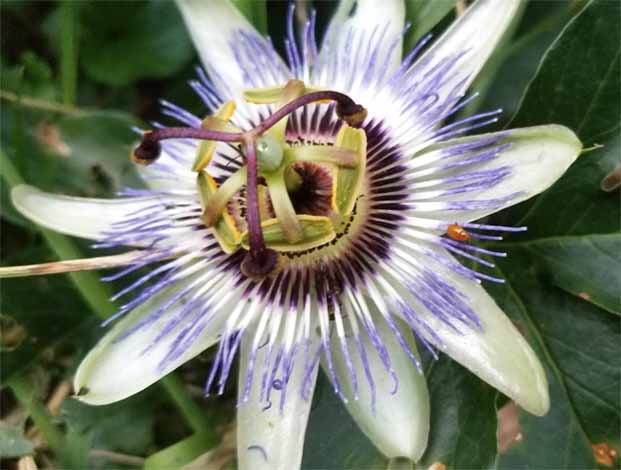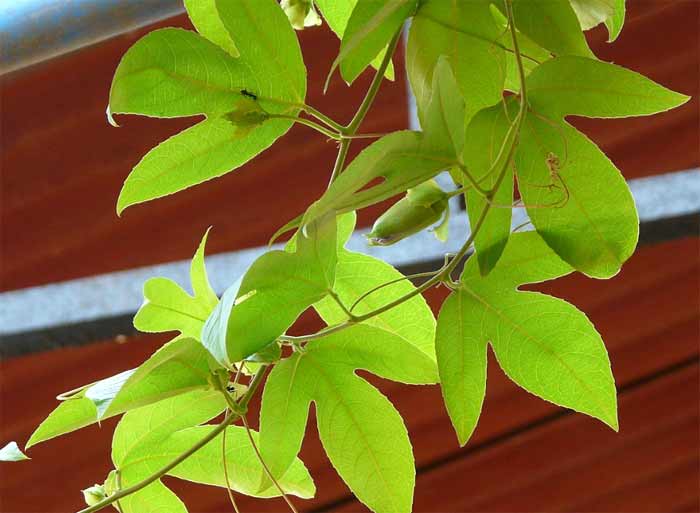Passion flower vine

Using passion flower to treat health problems
Passion flower (Passiflora incarnata) is a medicinal herb that calms the nerves and induces sleep. It is especially recommended for insomnia, panic attacks, and anxiety.
Passion flower is an excellent remedy for menopausal symptoms such as hot flashes, abdominal pain, and headache.
This herb can also help lower high blood pressure when the condition is stress related.
Passion flower is used for relieving back pain, shortness of breath, diarrhea, and hemorrhoids.
The herb is useful in the treatment of asthma, shingles, attention deficit disorder, restless leg syndrome, and some kinds of seizures.
Combine with valerian or lemon balm for best results.

Use passion flower to treat withdrawal symptoms.
Passion flower is also used in the treatment of Vicodin, cocaine, heroin, opium, and alcohol withdrawal symptoms.
The herb contains alkaloids and flavonoids that are considered effective non-addictive sedatives.
Passion flower for a better life
Studies show that Passion flower may help fight Parkinson's disease, cancer, HIV, leukemia, epilepsy, and more. Passion flower is even used to treat enlargement of the male breasts caused by excessive estrogen.
Science and passion flower vine `
Research suggests that passion flower might help reduce anxiety before a surgical or dental procedure.
Passion flower's medicinal properties are well documented.
The herb helps reduce stress and is useful in the treatment of insomnia, anxiety, depression, burns, diarrhea, painful menstruation, hemorrhoids, convulsions, neuralgia, and addiction.
Passion flower vine contains powerful alkaloids, phenolic compounds, flavonoids, and glycosides. These substances help protect the body and mind from the effects of stress by reducing cellular inflammation.
This is great news for healthcare professionals looking to find natural treatments for their patients.
With depression panic attacks, anxiety, and insomnia on the rise, people need something besides expensive pills that are addictive and have horrible side effects.
Use passion flower to increase concentration.
Widely used among the Cherokee people, passion flower is valuable as a medicine and in religious ceremonies. It is believed that use of the herb not only relieves pain and reduces anxiety, but also increases concentration and expands the mind.
Passion flower is a spiritual herb.
Many cultures consider passion flower to be a spiritual herb. It is believed to be symbolic of the crucifixion of Christ and is said to bring peace and blessings to the home when grown near the front gate.

Use blossoms, fruits, leaves, stems, and roots
Passion flower’s delicate, colorful blossoms develop from plain, smooth buds. Blossoms, leaves, stems, and roots are used in herbal remedies and in the kitchen.
Passion flower vine produces a low calorie fruit that is rich in vitamins, calcium, phosphorus, and iron. The fruits are sweet and juicy and delicious when added to salads, jellies, and other condiments.
A look at Passion Flower
Herbal Jedi recommends passion flower tincture in this YouTube video.
Passion flower vines are easy to start from seed.
Passion flower grows in partially shaded, dry areas, and has a long vine which grows more than 30 feet in length.
The plant has alternate leaves with finely toothed lobes. Passion Flower is easily cultivated and may be started from seed, root division, or transplanted from the wild.
The plants prefer slightly acid soil and the use of a trellis is recommended when grown in a home garden.
The flowers bloom from May to July and the resulting fruit is a yellow “berry” containing numerous seeds.
Harvest fruit when it reaches the size of a hen’s egg and turns soft.
Harvest leaves at the same time, and dry for winter use. Dried passion flower vines make a healing tea that the whole family will love.
In the North Georgia area, passion flower is often found growing in meadows, along fence lines, and beside wooded areas. The distinctive white, purple, lavender, or pink “frilly” blossoms make passion flowers easy to identify. It grows wild in the Southern United States and parts of Mexico.
Passion flower is also known as May-Pop, Holy Trinity Flower, crown of thorns, and passion vine.
If you are blessed to have plenty of the passion vine flowers, go ahead and pick four or five of them for tea. The blossoms are delicate, and should not be boiled. Just put a blossom or two in a cup, and cover with simmering water. Cool a bit, then sip. This herbal tea is an exotic treat for sure.
*Avoid passion flower during pregnancy. Do not use passion flower if taking MAO inhibiting anti-depressants drugs. Use of passion flower vine can cause drowsiness, confusion, and uncoordinated movement. Do not use passion flower when driving, when operating heavy machinery, or when using any dangerous equipment.
Always consult with a healthcare professional before taking any herbal remedies especially if pregnant, nursing, or taking other medicines.
Sources:
https://www.ncbi.nlm.nih.gov/pmc/articles/PMC7766837/
https://www.nccih.nih.gov/health/passionflower
Blessings to you and yours!
Thanks so much for reading my blog. Jan.

*Note - the information on this website has not been evaluated by the Food and Drug Administration.
© 2005-2024 website design and content by Janice Boling